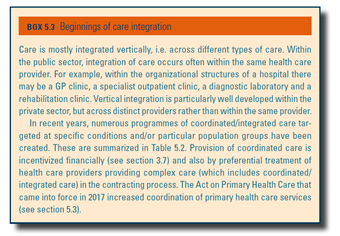-
29 September 2024 | Policy Analysis
Rare Disease Plan for 2024–2025
6.2. Future developments
Implementation of the hospital network and reform of primary care will likely remain on the reform agenda in the years to come. Related to that, the broader issue of care coordination (koordynowana opieka zdrowotna, KOZ; see Box5.3) will likely consume much political capital in near future. The goal of ongoing changes is to create a system of comprehensive health care financed from public sources. The scope is limited to specific health problems (e.g. invasive cardiology, psychiatric care) or groups of patients (e.g. pregnant women and children) (Zapaśnik et al., 2016). The government, in collaboration with the World Bank, has elaborated alternative models of coordinated care that are currently being implemented via local pilots (WB, 2018a).
Box5.3
- Model 1: Expanded primary care services, covering the original scope of primary care services and selected services provided by ambulatory specialist care; with broader competences of the primary care team of GPs, nurses, midwives, and, optionally, physical therapists.
- Model 2: Outpatient Managed Care (OMC) model of enhanced PHC, which includes the existing scope of PHC, a wide variety of services including outpatient specialist care, comprehensive preventive services and ambulatory rehabilitation, offered by one medical facility or a group of medical facilities in cooperation with one another.
- Model 3: Home Care Centre (HCC) model offering improved integration between health care and social care services for older people.
Primary care teams are to play key roles in each of the coordinated care models, guiding patients through the health system. To that end they will dispose of delegated budgets that can be spent on diagnostics and specialist ambulatory care. Pilots (called PHC PLUS) have started in March 2018 and will run until the end of 2019. They will be financed from the EU funds and will cover patients with 11 chronic diseases in 45–50 PHC units selected in a competitive process across all voivodeships. Approximately 700 PHC entities (out of about 6000) with contracts with the NFZ have expressed their willingness to participate in the pilots, although this number has fallen after details about the administrative burden related to the pilots have been made available.
In April 2018, the Minister of Health initiated a nationwide debate (a series of conferences) on the directions of changes in the Polish health care sector, “Together for Health”,[22] involving 60 academic researchers and other health care system experts. This work will be concluded with the publication of new strategic guidelines, “Social Programme for Health”, in mid-2019.
- 22. https://www.gov.pl/zdrowie/wspolnie-dla-zdrowia ↰
The Council of Ministers has formally approved the Rare Disease Plan for 2024–2025. The overarching objective of this initiative is to enhance the quality of life for patients with rare diseases and their families. The plan provides for comprehensive and coordinated healthcare services. The plan also anticipates enhanced access to contemporary medical apparatus and pharmaceuticals, in addition to specialized nutritional supplements for rare diseases. Approximately PLN 100 million has been allocated for this purpose.
It is estimated that between two and three million people in Poland are affected by rare diseases. The solutions proposed in the Plan are based on the following:
- The establishment of additional Expert Centres for Rare Diseases, whose remit will be to provide healthcare services with particular attention to patients with rare diseases;
- Improved access to research used in the diagnosis and treatment of rare diseases;
- Conduct an analysis by 31 December 2024 to complete the list of guaranteed services and to determine the most appropriate method of financing genetic testing;
- Carry out an analysis to determine the most appropriate method of financing highly specialized non-genetic laboratory tests that are used in the diagnosis and monitoring of rare diseases;
- Implement quality control of laboratories that perform large-scale genomic tests used in the genetic diagnosis of rare diseases;
- Enhance access to modern medical equipment and medicines and medicines for special nutritional use in rare diseases; and
- Improve the infrastructure of healthcare providers.
The Rare Diseases Information Platform (https://chorobyrzadkie.gov.pl) was launched in October 2023. It will be updated and supplemented with new information to expand and develop knowledge about rare diseases. A nationwide public awareness campaign will be initiated, and a System for Rare Diseases will be established. This system will collate data to populate the Polish Register of Rare Diseases and the Rare Disease Patient Card, which are integral components of the system for monitoring processes related to medical care and improving the safety of patients with rare diseases.

